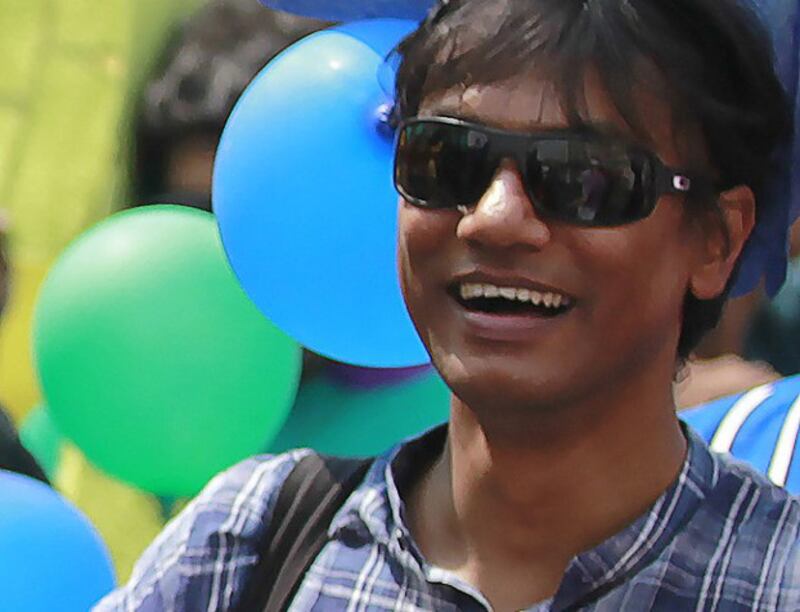A verdict is expected soon for eight suspects charged with murder over the killing of two Bangladeshi gay-rights activists who were hacked to death in a Dhaka apartment five years ago, officials said.
But the work they did advocating for the sexual minority all but perished along with them, according to fellow campaigners.
“The social movement to establish the rights of the LGBTQ people in Bangladesh after the Xulhaz-Tonoy murder has almost gone. Many of the activists have either gone into hiding or left the country,” an activist who asked to be identified only as Min told BenarNews.
U.S. Secretary of State Antony Blinken was among those who marked the fifth anniversary of the killings of U.S. government employee Xulhaz Mannan and theater artist Mahbub Rabbi Tonoy, which prosecutors say were motivated by their activism on behalf of LGBTQ people.
Xulhaz worked at the U.S. Embassy in Dhaka for nine years and later for the Bangladesh office of the United States Agency for International Development, where he helped lead programs to promote human rights.
“Xulhaz’s selfless dedication to advancing the principles of diversity, acceptance and inclusion exemplified the best of Bangladesh,” Blinken said in a statement on April 25.
A punishable offense
The brutal killings on that date in 2016 were carried out by men who entered Xulhaz’s apartment by posing as delivery men while carrying a box of machetes. Police charged eight suspects with murder in July 2019 and a trial began on Nov. 19 of the following year.
Four of the suspects are behind bars and the rest are fugitives.
A verdict expected on April 6 was postponed because of a lockdown declared by the government amid a surge in COVID-19 cases, said Golam Sarwar Khan Zakir, a public prosecutor of the anti-terrorism tribunal in Dhaka.
“The lockdown being over, the court will set a fresh date for the verdict,” he said.
All eight suspects are suspected members of Ansar al-Islam, also known as Ansarullah Bangla Team, an al-Qaeda affiliated outfit that claimed responsibility for a string of killings of secular intellectuals and activists, most of them in 2015 and 2016.
“The trial of the killers of Xulhaz Mannan is at the final stage. The killers cannot escape justice,” Law Minister Anisul Huq told BenarNews.
Asked if the government had taken steps to protect the rights of LGBTQ citizens, Huq said that Bangladesh law prohibits protecting their identity.
“The government must protect the rights of all its citizens, including the LGBTQ people, in Bangladesh. But the government cannot promote homosexuality and LGBTQ activities. Our existing Penal Code penalizes homosexuality; this is a punishable offense,” he said.
“Unless the law is changed, the government cannot promote the rights of homosexuality in Bangladesh.”

‘We cannot even gather’
Min, who heads a community-based group fighting for the rights of homosexuals and transgender people in Bogura, in northern Bangladesh, told BenarNews that some NGOs in upscale areas of Dhaka began promoting LGBTQ rights in the 1990s.
“But what Xulhaz Mannan did was different from the NGOs’ approaches: he took the initiative to mobilize the LGBTQ people beyond the posh areas and other districts. He had been receiving very good responses from them,” Min said.
The LGBTQ magazine he launched, Roopban, “created a sensation in the country about the rights of these neglected people,” she said.
Another transgender woman, who would not disclose her identity because of safety concerns, told BenarNews that there were an estimated 10,000 LGBTQ people in Bangladesh, though the government has no data on this.
“Before the murders of Xulhaz and Tonoy, we could meet, organize programs, and talk freely. Many LGBTQ people were coming forward to expose themselves. In 2014, the LGBTQ people for the first time held a rainbow rally for the Bengali New Year celebration.
“But the murders changed everything overnight. During the last five years, we cannot even gather at a place let alone organize a program,” the transgender person said.
Members of the economic elite can arrange small gatherings in protected facilities, “but the common LGBTQ people in other areas have no such space,” she said.
And while people have to some extent accepted transgender people, or “hijras,” most Bangladeshis remain completely ignorant of the wider community of LGBTQ people, she said.
Meanwhile, the pain of the killings continues to reverberate.
Xulhaz’s mother, an 84-year-old dementia sufferer, still asks about him, said Minhaz Mannan, Xulhaz’s brother.
Relatives “frequently tell lies,” saying he is at the home of his sister in the United States, Xulhaz said.
“If she could come to know that Xulhaz was killed, she would die,” he told BenarNews.
“The trial has been going on ... I hope that we will get fair justice, and the real culprits would face punishment,” he said.
